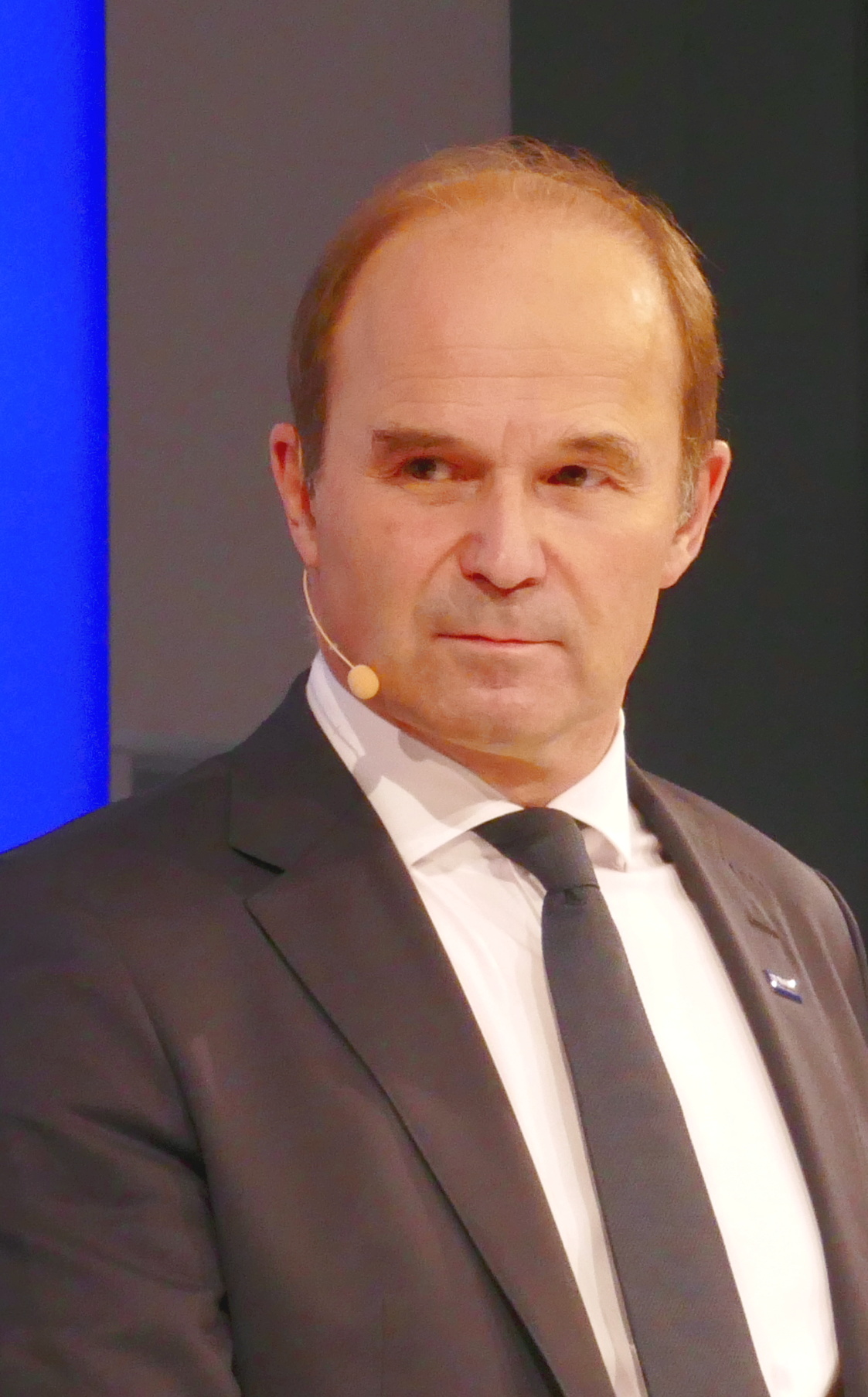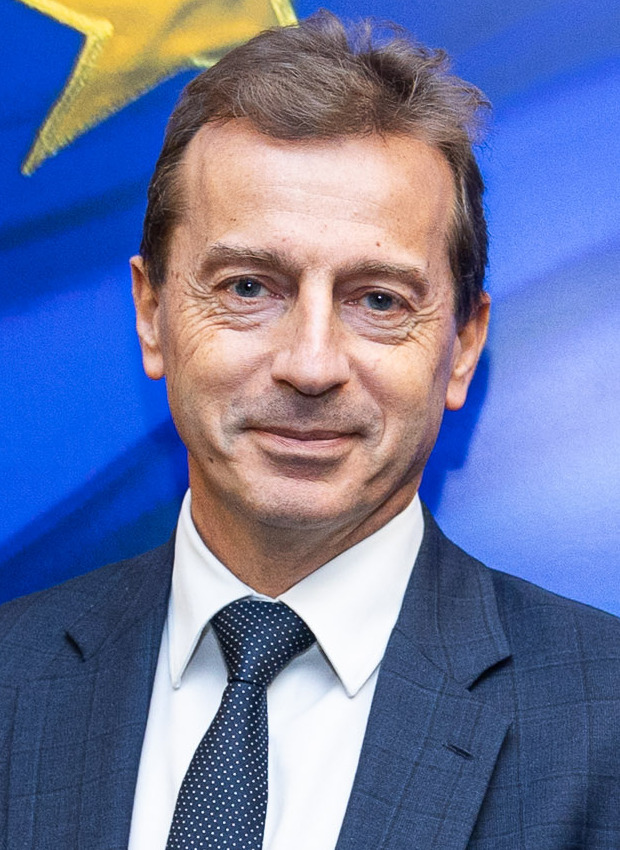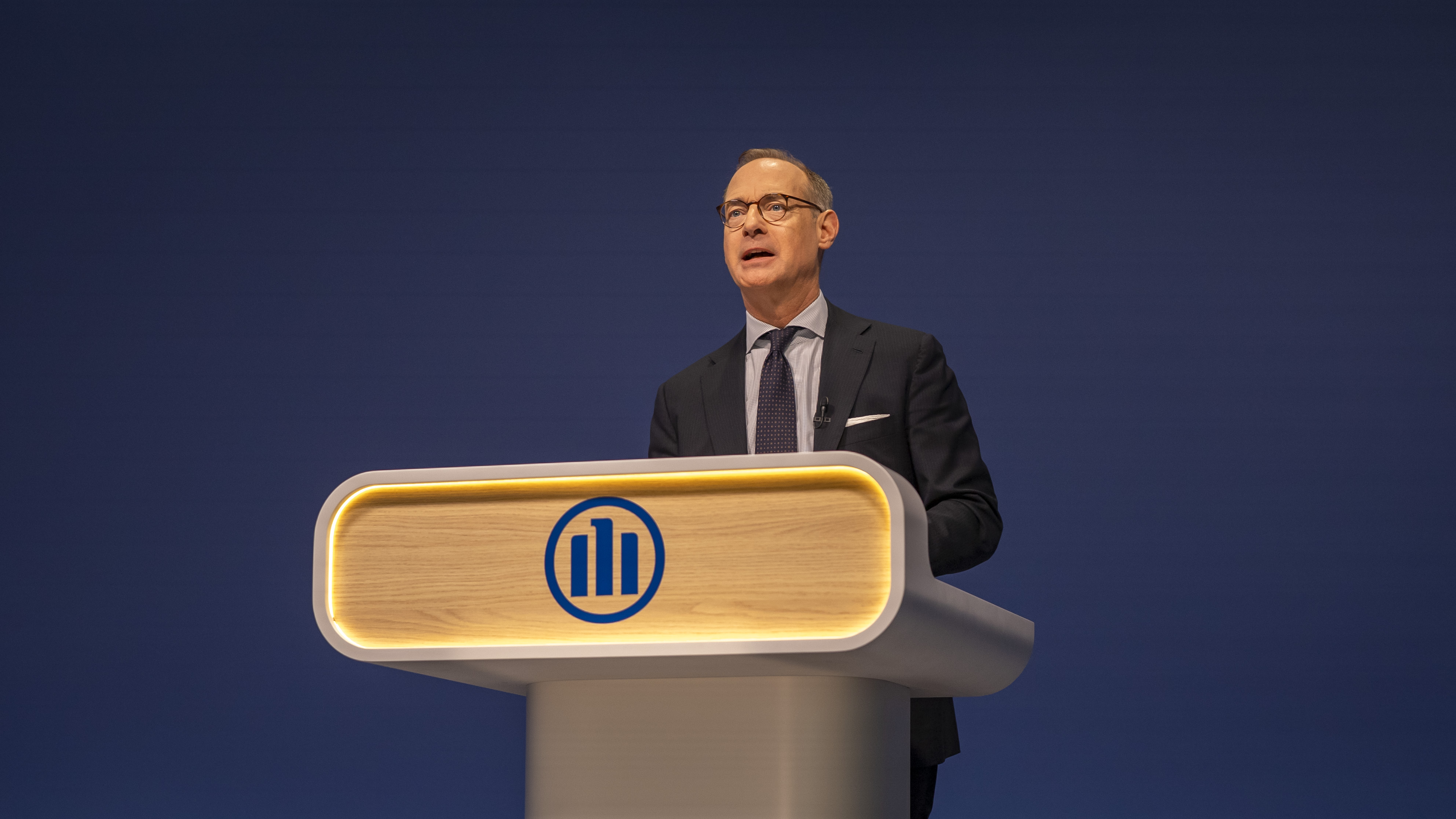Executive Summary: Engineering Leadership in Defense Transformation
Armin Papperger stands as one of Europe's most consequential defense industry leaders, transforming Rheinmetall AG from a traditional dual-business model into what he calls a 'global defense champion.' Since becoming CEO in January 2013, Papperger has overseen an extraordinary 1,200% stock price increase while positioning Rheinmetall as Europe's largest defense contractor and a critical supplier of military equipment to Ukraine. His engineering background and deep sector expertise have enabled him to navigate the complex transition from peacetime manufacturing to wartime production, making Rheinmetall the largest and most successful German manufacturer of vital 155mm artillery shells. Under his leadership, Rheinmetall achieved record sales of €9.8 billion in 2024, representing 36% growth, with defense sales surging 50% to €7.6 billion and an order backlog reaching €55 billion.
Leadership Journey: From Quality Management to CEO
Armin Theodor Papperger's journey to the helm of Rheinmetall represents a classic case of internal leadership development and engineering excellence. Born on January 30, 1963, in Mainburg, Germany, Papperger's career spans over three decades within the same organization, providing him with unparalleled institutional knowledge and technical expertise.
After completing his mechanical engineering degree, Papperger joined Rheinmetall in 1990 in quality management within the Defense sector. This foundational experience in quality systems would prove crucial to his later success in scaling defense production while maintaining the stringent reliability standards required for military equipment. His progression through the organization was methodical and comprehensive: from 2001, he served as managing director of various Defense subsidiaries, gaining operational experience across different business units.
The pivotal moment in Papperger's career came in July 2007 when he was appointed head of the Weapon and Munitions division. This role positioned him at the center of Rheinmetall's most critical defense operations and provided the platform for his eventual ascension to CEO. By early 2010, his responsibilities expanded to include both the Vehicle Systems and Weapon and Munitions divisions, effectively making him the operational leader of Rheinmetall's entire defense portfolio.
His appointment as Chairman of the Executive Board and CEO on January 1, 2013, marked the beginning of what would become one of the most successful transformations in European defense industry history. The timing was prescient, as his tenure would coincide with fundamental shifts in European security architecture that would demand exactly the kind of strategic vision and operational excellence he possessed.
Strategic Vision: From Dual Business Model to Defense Focus
Papperger's most significant strategic decision has been the deliberate transformation of Rheinmetall from its traditional dual business model—combining automotive and defense operations—to a focused defense champion. This strategic pivot represents one of the most significant corporate transformations in recent German industrial history.
The automotive division, which employs 6,700 people, was declared no longer a core business at the 2025 AGM, with Papperger stating that a review was underway that may result in its divestiture. The Power Systems division, serving civilian industries including automotive and energy, similarly fell outside the company's core focus. This strategic clarity reflects Papperger's understanding that the 'era of rearmament' in Europe requires total organizational commitment to defense excellence.
His strategic vision encompasses three fundamental pillars: technological leadership, production scalability, and global partnership development. Under his guidance, Rheinmetall has invested nearly €8 billion in new manufacturing facilities, acquisitions, and supply-chain security. This massive capital deployment demonstrates Papperger's long-term commitment to building defense capabilities that can respond to both current conflicts and future security challenges.
The geographic expansion strategy under Papperger's leadership has been equally impressive. Rheinmetall now operates manufacturing facilities across Europe, including plants in Ukraine, Lithuania, Hungary, and Romania. This distributed manufacturing approach not only reduces geopolitical risk but also positions Rheinmetall as a truly European defense champion capable of supporting NATO allies across the continent.
Perhaps most significantly, Papperger has articulated an ambitious vision for Rheinmetall to achieve €40-50 billion in annual revenue by 2030. This target represents more than a quadrupling of current revenues and reflects his confidence in the structural changes driving European defense spending. The goal is not merely about growth but about establishing Rheinmetall as a primary pillar of European defense industrial base.
Market Impact: Record Growth and Industry Leadership
The financial results under Papperger's leadership speak to both his strategic vision and operational execution. The 2024 performance represents a watershed moment for both Rheinmetall and the broader European defense industry. Sales reached €9.8 billion, with the defense division leading growth at 50% increase to €7.6 billion. The operating result of €1.478 billion, up 61%, and improved operating margin to 15.2% demonstrate operational excellence alongside top-line growth.
The order backlog of €55 billion—representing more than five years of current revenue—provides unprecedented visibility into future performance and validates Papperger's strategic positioning. This backlog reflects not just current demand but the long-term contracts that characterize defense procurement, providing Rheinmetall with financial stability and growth certainty rare in industrial companies.
Papperger's market impact extends beyond financial metrics to fundamental industry transformation. Rheinmetall's emergence as the largest and most successful German manufacturer of 155mm artillery shells has made the company indispensable to Western defense capabilities. The artillery shells produced under his leadership have become what military analysts describe as the 'make-or-break weapon' in Ukraine's defense against Russian aggression.
The stock market has recognized Papperger's transformation, with Rheinmetall shares delivering an almost 1,200% increase since he took leadership in 2013. This performance places Rheinmetall among the top-performing stocks in European markets and reflects investor confidence in both his strategic vision and execution capabilities. The company's promotion to the DAX index in 2023 further validated its importance to the German economy and Papperger's role in this achievement.
Beyond financial performance, Papperger has positioned Rheinmetall as a serious partner for American defense companies, opening opportunities in the world's largest defense market. His strategic relationships with U.S. defense contractors and government agencies have created new avenues for growth and technology sharing, reinforcing Rheinmetall's position as a global rather than merely European player.
Industry Influence: Redefining European Defense
Papperger's influence extends far beyond Rheinmetall's operations to encompass fundamental questions about European defense capabilities and industrial policy. His leadership during the Ukraine conflict has positioned him as one of the most important figures in European defense strategy, with his decisions directly impacting the outcome of the largest European conflict since World War II.
The decision to establish manufacturing facilities within Ukraine itself represents unprecedented commitment to wartime production support. Papperger's announcement of plans to produce Lynx infantry fighting vehicles inside Ukraine and establish joint production facilities for artillery ammunition demonstrates strategic thinking that goes beyond traditional commercial considerations. His commitment to produce a 'six-digit number' of 155mm artillery rounds specifically for Ukraine shows understanding of the scale required for modern warfare.
His influence on European defense policy has been equally significant. Papperger's public statements about the 'era of rearmament' have helped shape political discourse about defense spending across Europe. His technical expertise and operational success provide credibility to arguments for increased defense budgets and industrial capacity building. Political leaders across Europe now routinely consult with Papperger on defense industrial policy, recognizing his unique position at the intersection of technology, manufacturing, and geopolitical strategy.
The security incident in 2024, where U.S. and German intelligence agencies foiled a Russian plot to assassinate Papperger, underscores his strategic importance to Western defense capabilities. The fact that Russia would target a defense industry CEO demonstrates the critical role he plays in supporting Ukraine and, by extension, broader NATO security interests. This incident has elevated his profile as a figure whose personal security has become a matter of international concern.
Papperger's board positions across multiple defense-related companies—including chairmanships at Pierburg Huayu Pump Technology, Rheinmetall Waffe Munition ARGES GmbH, Nitrochemie AG, and Kolbenschmidt Pierburg Shanghai Nonferrous Components—extend his influence across the European defense supply chain. These positions allow him to coordinate strategy and ensure compatibility across different suppliers, effectively serving as an informal coordinator of European defense industrial policy.
Innovation and Technology Leadership
Papperger's engineering background has proven invaluable in driving innovation across Rheinmetall's defense portfolio. His deep technical understanding enables him to make informed decisions about R&D investments, technology partnerships, and product development priorities. Under his leadership, Rheinmetall has maintained technological leadership in critical areas including artillery systems, armored vehicles, and ammunition technology.
The development of next-generation defense systems under Papperger's guidance reflects both his technical acumen and strategic vision. Rheinmetall's Lynx infantry fighting vehicle, which will be produced in Ukraine, represents state-of-the-art military technology adapted for contemporary warfare requirements. Similarly, the company's artillery systems have evolved to meet the demands of high-intensity conflict, incorporating advanced targeting systems and improved reliability.
Papperger's approach to innovation extends beyond product development to manufacturing processes and supply chain optimization. The massive investment in new production facilities reflects his understanding that technological superiority must be matched by manufacturing capability. His decision to distribute production across multiple countries demonstrates sophisticated thinking about supply chain resilience and geopolitical risk management.
The integration of digital technologies into traditional defense manufacturing under Papperger's leadership has positioned Rheinmetall at the forefront of Industry 4.0 applications in defense. Advanced manufacturing techniques, predictive maintenance systems, and digital supply chain management have improved both efficiency and quality while reducing production costs.
Global Partnership Strategy
One of Papperger's most significant achievements has been the development of strategic partnerships that extend Rheinmetall's global reach and capabilities. His recognition that Rheinmetall must become 'a serious partner for U.S. companies' has opened new markets and technology sharing opportunities that would have been impossible for a purely European company.
The partnership strategy encompasses both horizontal relationships with other defense contractors and vertical integration with suppliers and customers. Papperger's meetings with political leaders, including Ukrainian President Zelensky, demonstrate his understanding that defense industry success requires government-level relationships and strategic alignment with national security objectives.
His approach to international partnerships reflects sophisticated understanding of global defense markets and regulatory environments. The establishment of manufacturing facilities in multiple countries not only provides operational flexibility but also ensures compliance with various national security requirements and export restrictions. This distributed approach allows Rheinmetall to serve customers globally while respecting sovereignty concerns and regulatory requirements.
Future Outlook: Defense Champion by 2030
Papperger's strategic vision for Rheinmetall's future centers on achieving €40-50 billion in annual revenue by 2030, establishing the company as an unquestioned European defense champion. This ambitious target reflects his confidence in structural changes driving defense spending and his ability to capture market share through operational excellence and strategic positioning.
The near-term outlook remains exceptionally strong, with Papperger expecting total sales to increase 25-30% in 2025 and defense sales to climb 35-40%. These projections, backed by the €55 billion order backlog, provide unusual certainty in strategic planning and resource allocation. The growth trajectory positions Rheinmetall to achieve market leadership in multiple defense categories while maintaining the operational margins that have characterized Papperger's tenure.
The planned divestiture of the automotive division represents the final step in Papperger's strategic transformation of Rheinmetall. By eliminating the dual business model that has characterized the company for decades, he will create a pure-play defense contractor optimized for the current security environment. This focus will allow for more targeted investment, clearer strategic communication, and improved operational efficiency.
Papperger's long-term vision extends beyond financial metrics to encompass Rheinmetall's role in European security architecture. His commitment to maintaining technological leadership, expanding production capacity, and developing strategic partnerships positions Rheinmetall as a critical component of European defense capabilities. The success of this vision will ultimately be measured not just in financial returns but in Rheinmetall's contribution to European security and stability.
Conclusion: Engineering Excellence in Strategic Leadership
Armin Papperger represents the intersection of technical expertise and strategic vision that characterizes exceptional industrial leadership. His transformation of Rheinmetall from a traditional automotive and defense conglomerate into Europe's premier defense contractor demonstrates both his understanding of geopolitical trends and his ability to execute complex organizational change.
The timing of his leadership—spanning the period from post-Cold War defense downsizing to the current era of European rearmament—has required adaptability and strategic foresight that few executives possess. His engineering background provided the technical foundation necessary to understand defense system requirements, while his decades of experience within Rheinmetall gave him the institutional knowledge required for effective transformation.
The results speak for themselves: 1,200% stock price appreciation, record financial performance, and positioning as a critical supplier to Western defense efforts. More importantly, Papperger has created an organization capable of supporting European security requirements in an increasingly uncertain world. His vision of Rheinmetall as a 'global defense champion' is no longer aspirational but increasingly recognizable as present reality.
For aspiring executives, Papperger's career demonstrates the value of deep technical expertise, long-term strategic thinking, and the courage to make transformative decisions. His success illustrates that engineering backgrounds can provide exceptional preparation for strategic leadership, particularly in industries where technical competence directly impacts business success.
As Europe continues to grapple with security challenges and defense requirements, Armin Papperger's leadership of Rheinmetall will remain central to both corporate success and broader geopolitical stability. His transformation of the company provides a model for how traditional industrial companies can adapt to changing strategic environments while maintaining operational excellence and financial performance.





